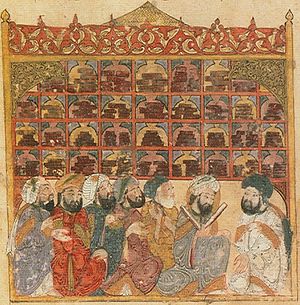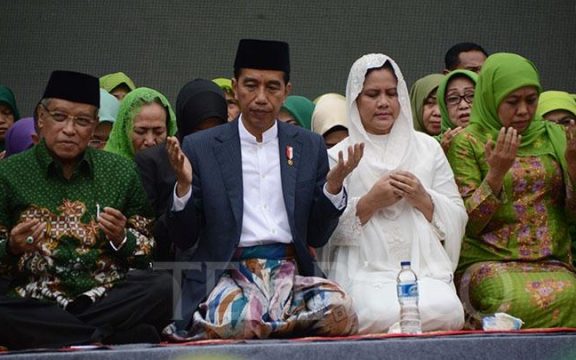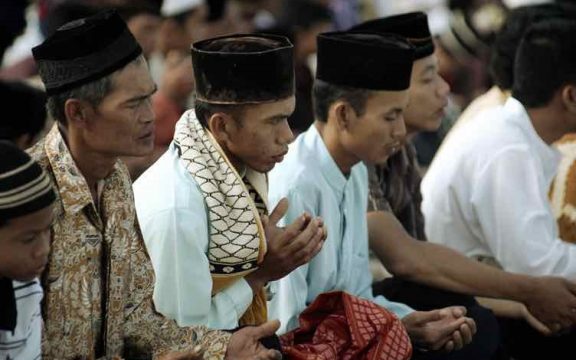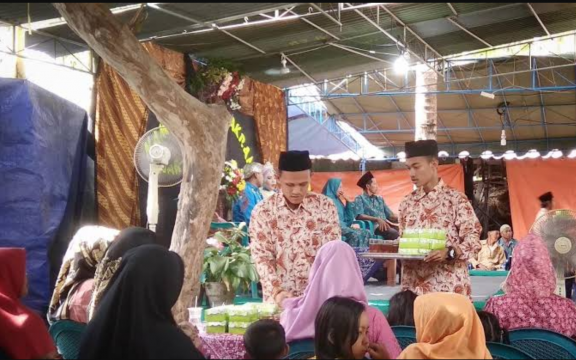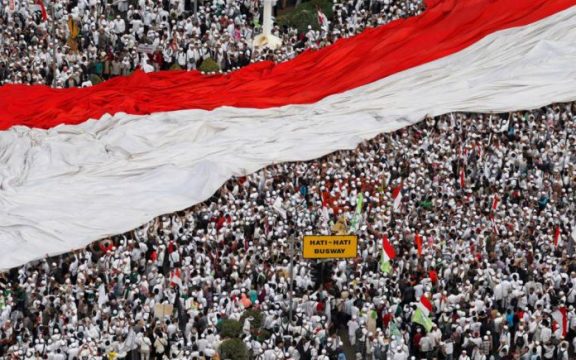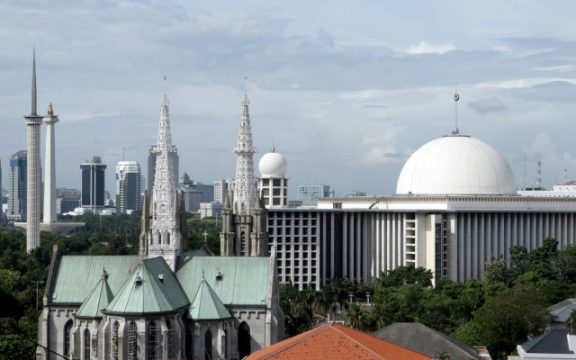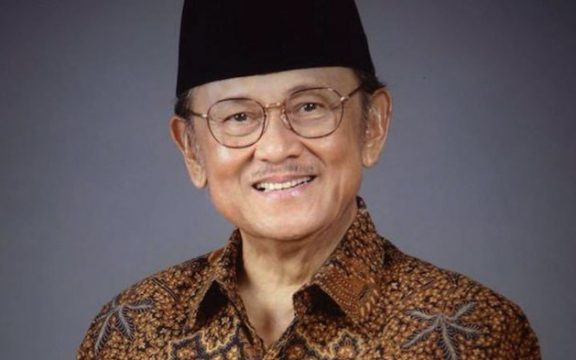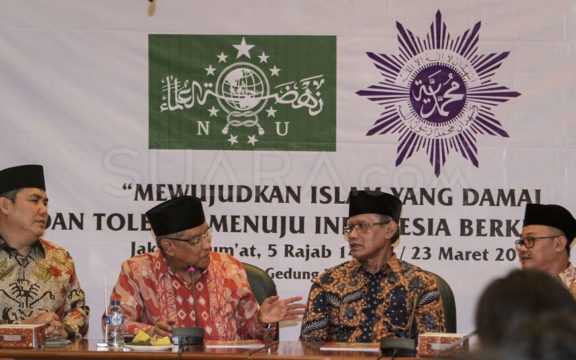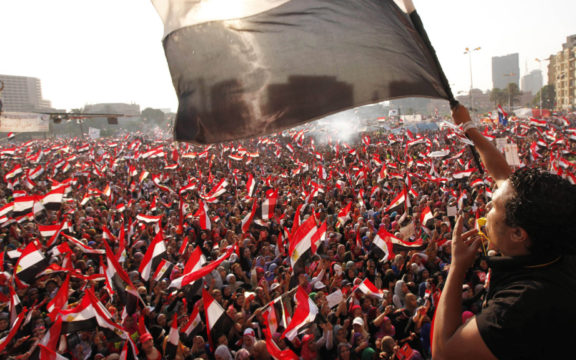These days the world is facing various severe conflicts and civil war declared in the name of race, or even faith. These wars are causing atrocious impacts; instability and devastation is not only destroying the country where the war is taken place, but creeping into the surrounding countries as well as the countries that also involved in it. We can easily how wae affects Syria, Yemen, Palestine, Egypt, Sudan and other Muslim countries which suffered gravely from continuous wars. We couldn’t turn a blind eye as to the cause of these wars; the main cause is shallowness in interpreting the religion that they embraced. Sometimes religion even used as a false doctrine to do violence in the name of faith, although we all could plainly see that those are only alibis for the sake of politics.
The idyllic Islam spoke of another face of Islam, Islam as the treatise of salvation. This face of Islam was proposed by historical facts in the era of promulgation in Mekkah and Madinah during the time of the Prophet PBUH. The Madinah Treatise’s achievements was a real prove that Islam bore not only promulgation mission but also humanitarian mission. Islam is not merely a faith that brings sharia (law), but also a faith of civilization.
Islamic doctrine had never been delivered wrapped in coercion, much less violence. Differences of point of views, ways of thinking and political views is a method to strengthen ghadhab or the competition emotion, and to develop social awareness for collective benefits, both in the realm of nation and faith. History had recorded ideological movements trying to direct people’s point of view into truth, because the trend of sectarian movements are contra-productive and deteriorating the society, This kind of group has been there since the time of the Prophet PBUH, famously known as Khawarij, a representation of fanaticism from the leader of the kabilah, chipped off little by little by the followers of the Prophet PBUH through a mutual understanding of social inclusion.
Cadres of the Prophet PBUH with ample knowledge and wisdom are students of the heirs of the Prophet PBUH. They gave a significant contribution to the establishment of a cultured society. Local wisdom as the main principal of promulgation done little by little and step by step, avoiding all offensive aspects, and not binary opposition which always laid up a “right-wrong” or “black-white” scheme, had its sources long into history. This is the principal of promulgation mirrored in Indonesian context; in the form of an institution with adequate methodology in contextualizing the absolute revelations into a relative reality. In Indonesia, this institution is known as the Nahdlatul Ulama (NU), which has branches abroad to propose regeneration mission and the promotion of “internationalization of moderation in Islam”.
In the emergence of nation-state model, there showed a similarity between Pancasila (the Five Principles) as a constitutional base with the Madinah Treatise from the time of the Prophet PBUH. During the time of the Treatise, the state was able to accommodate maqasheedul sharia as a universal concept for all the religions. According to the consensus of the ulama, Indonesia is not an Islamic state and simultaneously not a secular country. Indonesia is a peaceful country (Darussalam) or a Muslim country. Darussalam had had normative and proactive support from the Nahdlatul Ulama (NU) as the biggest Islamic mass-organization, without ruling out the other organizations.
This moderation principal, sharia-speaking, explained the position of NU as an organization, naturally as a community (family-like) and ma’rifat-speaking, is Islam itself. This socio-religious organization keeps its commitment with the founders’ mission, and that is to keep the authentic message of the revelation through clear knowledge transmission and massive social transformation into the grass roots as well as into the ivory tower of elites.
Attitudes toward politics and culture are the omitting of castes and pre-Islamic culture that do not correspond with the normative base and promulgation. Because the aqidah (base of faith) normative base and the fiqh could still accommodate local cultures. Besides, the aqidah doesn’t set an exclusive point of view in seeing the madzhab of kalam. As long as one is still harboring under the umbrella of Islam, saying shahadah (Muslim’s profession of faith), pray while facing kibla (the direction of Kaba in Mekkah), believe in the five pillars of Islam and the six pillars of faith, that means one is still a Muslim. It is different with other groups; groups that scholars easily found collision between their interpretations and the nash of Al Quraan and al Hadith. Example of these groups included the Mu’tazilah school and other schools.
International mission of this socio-religious organization is to spread the Sunni school, definitively negated by the Shiite. From the matter of flexibility in aqidah and da’wa (promulgation) Sunni school is distinguished in two, that is purification Sunni and methodological Sunni. The purification school could be seen in the religious phenomenon in Saudi Arabia, later is called the Wahabi. Methodological Sunni could be observed in Indonesia, with the way the NU identified itself in the matter of mazhab (school), which, in countries like Egypt or Sudan, would be called sufi. This group is a majority group used to seek law status with qouli method, through the turats book (commonly called the yellow books) and tamanhuj (using the mazhab’s imam methodology) as an alternative. On the other hand, we can’t deny the existence of countries like Egypt that is more define to do tamanhuj. It’s a fact that moderation in Sunni school is defining the purity of the Prophet’s teachings without castrating the dynamic, relative social inclusion
In the realm of regeneration, on the science genealogy with the talaqqi-based institution, the NU is really strict. Knowledge as a part of religion is distinguished in thought sacralisation. The inherited understanding keep the balance between accuracy of the text and the sources, methods with the object it discuss and the realm of knowledge with the limit of human ability. It is different with thoughts, that sometimes is out of the needs and ability of the human reasoning to chase relative, even speculative, desires. According to Islamic perspective this is a prove NU has the scientific discipline. These three criterions are strengthened by the jarh wata’dil which not present in the Western tradition when they reviewing Islam, except the orientalists who are interested in reviewing Eastern culture with their myopic lenses, their manipulative interpretation or their “science for science” principal, which honesty is still need to be considered.
Based on the above thoughts, Lakpesdam NU Special Chapter Sudan designed a program for the strengthening of research methodology and inherited turats from the classical ulama. We credited the classical ulama’s books not because of we are anti-methodology but it was a form of cautiousness, and a consequence for the vinculum of the past generation’s scientific transmission. Like the ulama in PBNU always did when they encounter a new fiqh problem and the law status hadn’t been found in the “yellow books”, the determining step is using the ilhaqi method and using the methodology as defined by LBM PBNU team, especially the Bahtsul Masa’il Maudlu’iyah Board of PBNU, the reference for national level.
The reference would then be supported by a heavy and strict study by the ulama of Nusantara’s works, e.g. KH Sahal Mahfudz with his social fiqh or the religious scholars from Middle East like Syekh Wahbah Zuhaily and Syekh Ali Jum’ah. The resulting references are not only explaining the moderate and productive attitude in the socio-religion field. In this case, Nusantara treatise is used as references for methodology, corresponded into the discussion object without being trapped into a contra-productive or procrastinating attitude.
When we see it from history, we can see that the sunni school in Indonesia has similarities with sunni in Sudan. The similarity is that both in Indonesia and in Sudan, Islam flourish as a teaching, and not an ideology. The base is benefit for all through Maqashidus Syari’ah reconciliation, with the state’s ideology as a demand from the condition. For instance, the phenomenon of the Constitution of Indonesia; it used a lot of law from the Dutch colonial era, but it was never contradicted with the principal of Islam. Sudan, where its positive law were inherited from England, showed that the English secularization during its colonial era was not successful enough, with the presence of majma’ fiqh, majma’ zakat and majma’ sufi; although the secularization did show an influence in institutional and bureaucracy fields. This includes the unavoidable reality where sufi groups are divided into two; and that is institutional-spirited group and ikhwan-spirited group, especially in the Government.
Research and methodology concept is important to develop in Muslim countries so that Muslim won’t be dazzled by Western countries’ advancement, making them sovereign of knowledge and superior, enough to set themselves as the standard for other civilization. Meanwhile, Indonesia, which was built under two strong influences (Islam and Western), wants to be an emerging power that inspire. This is a chance for NU as the mainstream Islamic mass-organization to promote Indonesia in the global community. The promotion could begin by the Lakpesdam NU Special Chapter Sudan, or any other foreign countries, that possesses cultural similarities (in religious matter like tasawwuf, for instance) to do a comparative study in the law istinbath methodology among the national boards of Sudan with national boards of Indonesia.
The most important thing to promote is Islam Nusantara construct, with the biggest number of Muslim in the world. This color could be recognized in the rich tradition of Indonesia, e.g. halal bihalal, selametan, kupatan, etc; and then these traditions should be productively interacted. This cultural production is an accumulated experiences of the Founding Fathers which we inherited. The ascetic experiences inheritable by Wali Songo, escapism that is so characteristically Gus Dur with his “gitu aja kok repot” (roughly means why bothered by a pebble?), the inductive rationalism of KH Sahal Mahfudh are the ingredients of the Islam Nusantara construct; not syncretic, but certainly has a dialectic connection between religion and culture, and not a sub ordinate-subjugation.
It’s very sad that a country with the biggest number of Muslims in the world is easily provoked to do violence in the name of faith. It is only obligatory for all the institutions or organizations in the field of education to be able to bring the reconciliation spirit among various parties. Thus it is a need to the young generations to learn from our history, and promoting it to other countries. For NU itself, with its special chapters abroad, it’s important to interweave a scientific interaction, socializing important works with the official language of the country and maintaining a collaboration in the socio-religious field. The external goal of this socialization is effacing the foul imagery of Islam that is presently dominating the collective consciousness of members of the western civilization. On the other hand, its internal goal is shaping young NU intellectuals with meaningful intellectual works with established research methodology and collective consciousness about the moderation of Islam.
his research would be focused on a comparative study between law istinbath methodology in Indonesia with the Majma’ Fiqh of Sudan as a step toward internationalization of moderation in Islam. Other than finding similarities between the two in order to establish a reconciliation of religion and culture, it is also to contribute to the conservation of Islamic civilization. Challenges that we way say are similar both in Indonesia and in Sudan is the “de-NU-ization” in Indonesia and radicalization in Sudan. Through the Special Chapter abroad, NU carries a role in deradicalization. The first step is to conduct dialogue with the country in which enrichment program to take part in the internationalization of moderation in Islam takes place. The Islamic school that will be the base for NU teachings are present in Sudan under the name of khalwah. But the campaign Gerakan Ayo Mondok (Let’s Enroll in an Islamic Boarding School) hasn’t established yet in Sudan. The offered solution is to bring to life the talaqqi majlis and international seminars to weave a productive interaction toward understanding.
The developed aspects is the manhaj aspect, or the methodology of two countries that possess a world view and knowledge system that—in the hypothetical stage—share the same points. The using of Islamic methodology in this research is due to the difference in consistency and accuracy compared to the Western model:
The West is agreed on the existence of the thought construct but still they bring out the epistemological difference amongst them. The difference happened between Hegel’s and Marx’s offers. They both agreed on the needs of thought construction but the methodological outlines are different when it relates to “how”, “what” and “where”.
The thought construction and Western methodology appears as a new phenomenon. This novelty reflects the course of the Western history itself. Their world thoughts interaction is always new and flourishing until it is impossible to differ which one is principally “established” and which one is “changed”.
Western thoughts construction and methodology is a reflection from the characteristics of the highly complex Western society. It is one of the problems in Western methodology.
From all these, there rose a basic question on why we should use Islamic methodology; with the following factor are the main considerations:
Muslims are convinced that Islam has a comprehensive view on life. In theological system this is a part of “al ma’lum min aldin bi aldharurah”; meaning (it is) a thing that a Muslim has no reason to say that he doesn’t know about it.
Muslims gave contribution in the matter of methodology. This had proven by the history of the knowledge codification.
The continuity of Muslims in guarding their Islamic identity did not stop in the realm of theory, but it is proven in the real life, with the methodological outline.
By: Ribut Nur Huda
![Islami[dot]co](https://en.islami.co/wp-content/themes/jambualas/images/logo.png)
